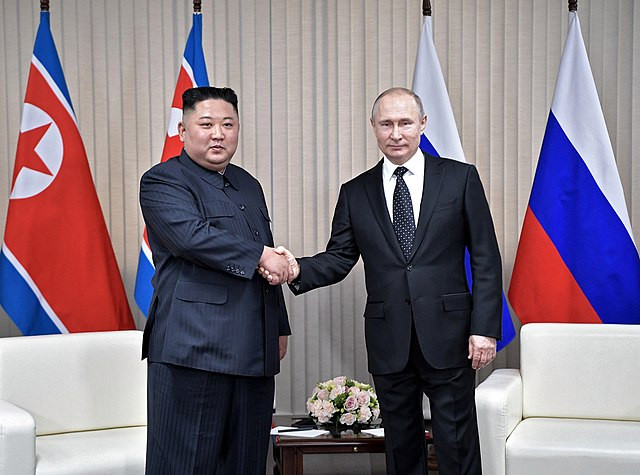The United States has confirmed the deployment of North Korean troops to support Russia in its ongoing war with Ukraine, marking a significant escalation in the conflict. Defense Secretary Lloyd Austin announced that North Korean soldiers, wearing Russian uniforms and carrying Russian equipment, have moved to the Kursk region, near the Ukrainian border. This development comes amid growing concerns over North Korea's increasing military ties with Russia, as it allegedly sends thousands of troops to assist the Kremlin in its efforts to bolster defenses and maintain its war efforts.
Speaking at a press conference alongside South Korean Defense Minister Kim Yong-hyun, Austin described the presence of North Korean troops in Russia as a "dangerous and destabilizing development." The Pentagon estimates that more than 11,000 North Korean soldiers have been deployed to Russia, with at least 3,000 moving closer to active combat zones. This deployment raises alarms about the potential for a broader escalation in the war, with Austin warning that North Korea's involvement could prolong or intensify the conflict.
"The likelihood is pretty high" that North Korean troops will be used in combat, Austin said, underscoring the potential consequences of their presence in the war. The defense secretary acknowledged that the deployment might encourage other nations to take action, although he did not provide specifics. Both Austin and Kim called on North Korea to withdraw its forces, fearing that Pyongyang may seek advanced military technologies, such as nuclear or missile capabilities, in exchange for its support to Russia.
North Korea's growing alignment with Russia has sparked concern across the globe, with leaders in the West worried about how it may further complicate the war in Ukraine. Canadian Prime Minister Justin Trudeau warned that the deployment of North Korean troops could increase the ferocity of the war. The U.S. and its allies have already accused Russia of seeking military aid from other nations, including Iran and North Korea, as it grapples with significant troop losses and a strained military infrastructure after more than two years of fighting.
This military cooperation between Russia and North Korea was also highlighted by the White House earlier this month when it released satellite images showing North Korea delivering 1,000 containers of military equipment to Russia by rail. While the full extent of the military assistance remains unclear, experts fear that North Korea may receive significant military benefits in return, such as weapons or nuclear technology.
Further complicating matters, reports suggest that North Korean troops may already be stationed close to the Ukrainian border. A Ukrainian official, speaking anonymously, told The Associated Press that North Korean forces are located approximately 30 miles from the Ukrainian front lines. Although no direct engagement between North Korean troops and Ukrainian forces has been confirmed, their presence could signal a new and potentially volatile phase in the conflict.
In addition to sending troops, North Korea has reportedly supplied ammunition and other military aid to Russia. Analysts believe that Pyongyang's growing involvement in the conflict could signal deeper collaboration between the two nations, which are both under heavy international sanctions. There is also speculation that Moscow could provide North Korea with advanced missile technology or nuclear assistance, further destabilizing the region.
As the situation intensifies, diplomatic efforts to de-escalate the conflict are being pursued. North Korean Foreign Minister Choe Son Hui is scheduled to hold strategic consultations with her Russian counterpart, Sergei Lavrov, in Moscow. The talks come amid growing fears that North Korea's involvement could alter the dynamics of the war in Ukraine. U.S. President Joe Biden has called the deployment of North Korean troops "very dangerous" and urged Ukraine to be prepared to respond should they cross into Ukrainian territory.
The presence of North Korean troops in Russia is just one of the latest indications that the Kremlin is seeking outside help to sustain its war effort. Western officials have suggested that Russia's reliance on foreign troops reflects its heavy losses and inability to replenish its military ranks. In a broader geopolitical context, this cooperation between North Korea and Russia has the potential to reshape alliances and deepen tensions in the already volatile region.
As North Korean troops continue to arrive in Russia, the question remains: what will Pyongyang demand in return for its support, and how will this new development affect the trajectory of the war in Ukraine? The answers could have far-reaching consequences, not just for Ukraine and Russia, but for the global balance of power as well.




